2023届高考英语二轮复习时态和语态复习课件 (14张PPT)
文档属性
| 名称 | 2023届高考英语二轮复习时态和语态复习课件 (14张PPT) | 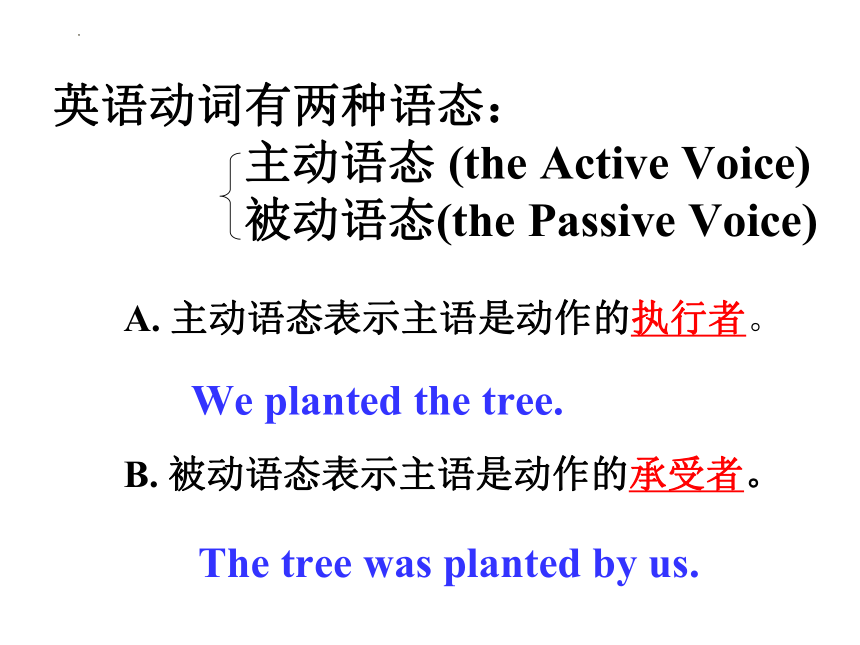 | |
| 格式 | zip | ||
| 文件大小 | 177.7KB | ||
| 资源类型 | 教案 | ||
| 版本资源 | 通用版 | ||
| 科目 | 英语 | ||
| 更新时间 | 2022-12-18 23:08:42 | ||
图片预览

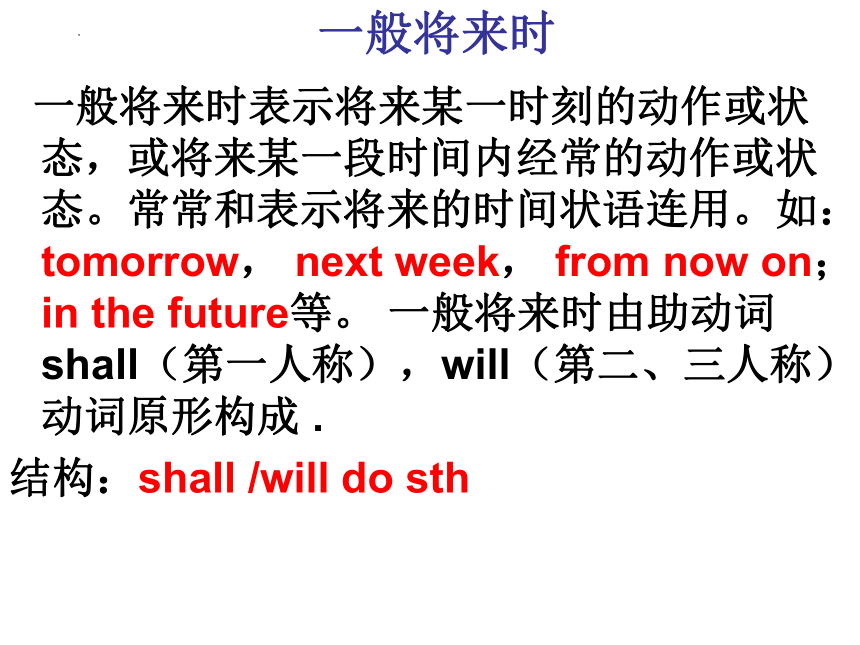
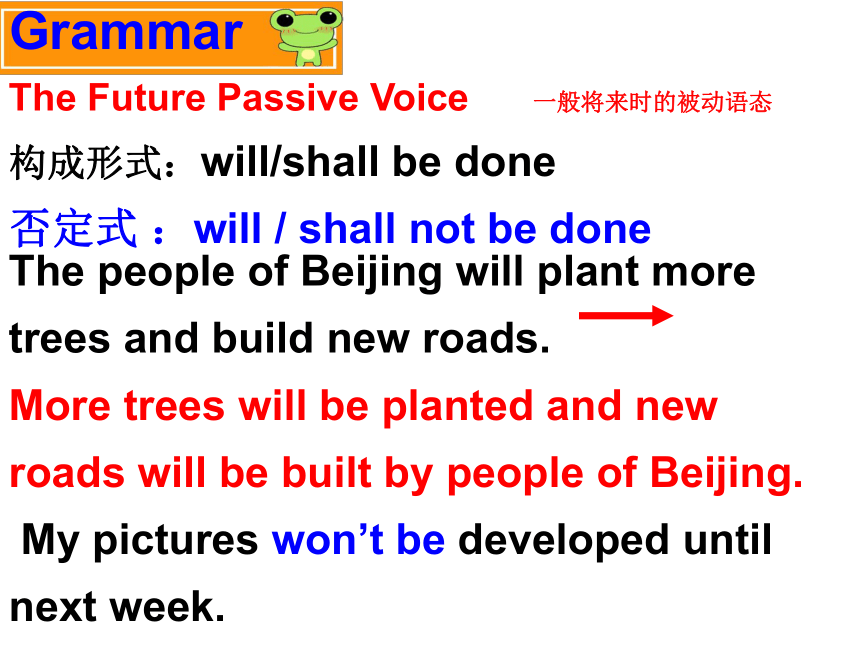
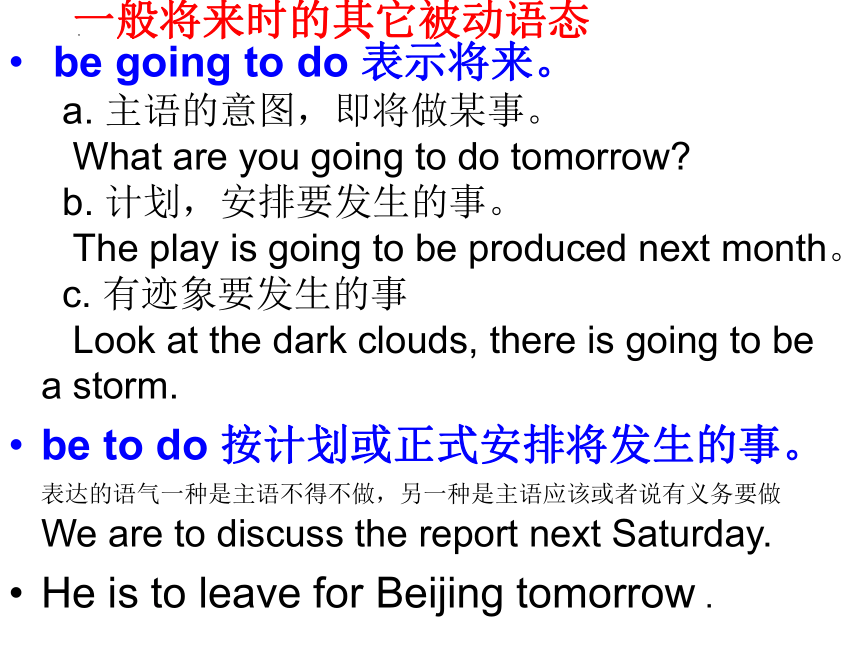
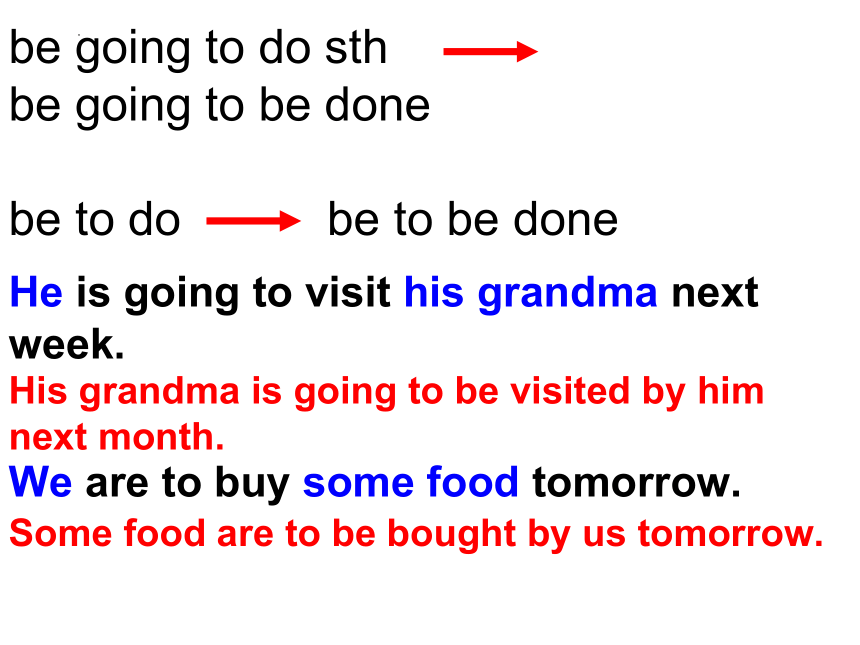
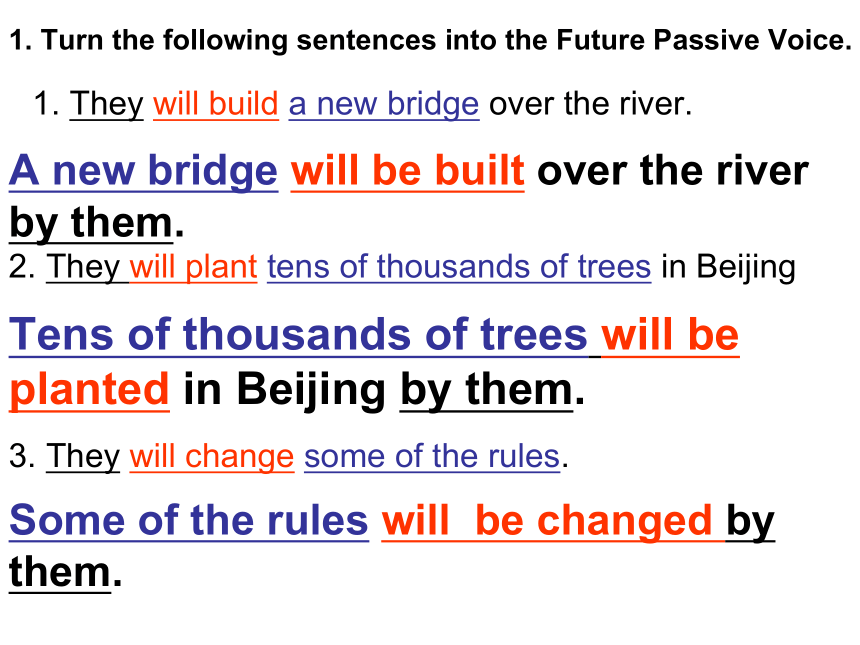
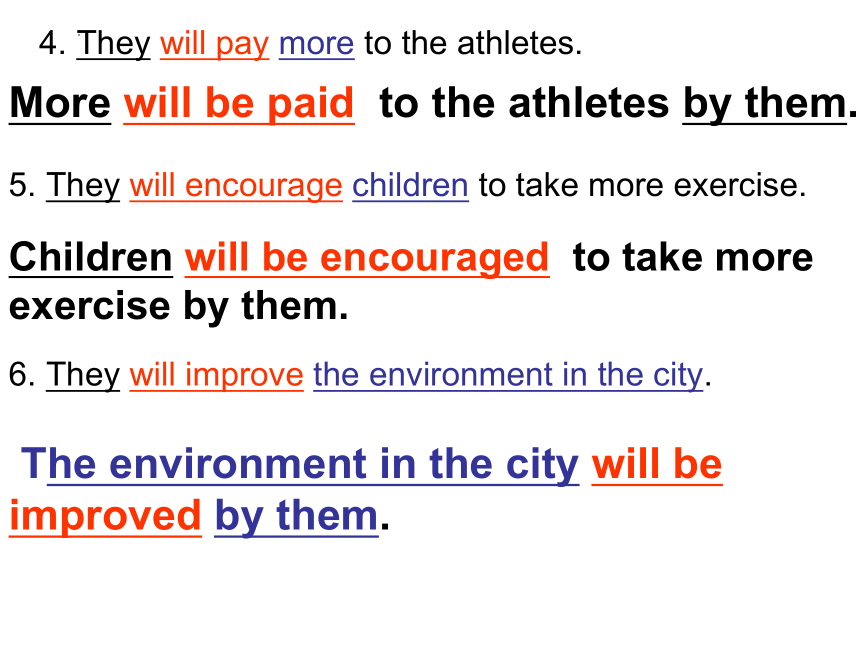
文档简介
(共14张PPT)
英语动词有两种语态:
主动语态 (the Active Voice)
被动语态(the Passive Voice)
A. 主动语态表示主语是动作的执行者。
B. 被动语态表示主语是动作的承受者。
We planted the tree.
The tree was planted by us.
一般将来时表示将来某一时刻的动作或状态,或将来某一段时间内经常的动作或状态。常常和表示将来的时间状语连用。如:tomorrow, next week, from now on;in the future等。 一般将来时由助动词shall(第一人称),will(第二、三人称) 动词原形构成 .
结构:shall /will do sth
一般将来时
Grammar
The Future Passive Voice 一般将来时的被动语态
构成形式:will/shall be done
否定式 :will / shall not be done
The people of Beijing will plant more trees and build new roads.
More trees will be planted and new roads will be built by people of Beijing.
My pictures won’t be developed until next week.
一般将来时的其它被动语态
be going to do 表示将来。
a. 主语的意图,即将做某事。
What are you going to do tomorrow
b. 计划,安排要发生的事。
The play is going to be produced next month。
c. 有迹象要发生的事
Look at the dark clouds, there is going to be a storm.
be to do 按计划或正式安排将发生的事。 表达的语气一种是主语不得不做,另一种是主语应该或者说有义务要做 We are to discuss the report next Saturday.
He is to leave for Beijing tomorrow .
be going to do sth
be going to be done
be to do be to be done
He is going to visit his grandma next week.
We are to buy some food tomorrow.
His grandma is going to be visited by him next month.
Some food are to be bought by us tomorrow.
1. Turn the following sentences into the Future Passive Voice.
1. They will build a new bridge over the river.
A new bridge will be built over the river by them.
2. They will plant tens of thousands of trees in Beijing
Tens of thousands of trees will be planted in Beijing by them.
3. They will change some of the rules.
Some of the rules will be changed by them.
4. They will pay more to the athletes.
More will be paid to the athletes by them.
5. They will encourage children to take more exercise.
Children will be encouraged to take more exercise by them.
6. They will improve the environment in the city.
The environment in the city will be improved by them.
主动表示被动的几种情况
1. 不及物动词与状语连用, 用以表示主语的
品质和状态。
常见动词是: cut, sell, read,
write, fill, cook, lock, wash, drive, keep等。如:
This knife cuts well.
The cloth washes well.
Meat won’t keep long in such hot weather.
2. 一些连系动词的主动式+形容词
常见动词: look, smell, taste, sound, feel,
prove, turn out等。
如: The apples taste good.
The flower smells wonderful.
The news proved/turned out true.
Cotton feels soft.
3. 不定式在某些形容词之后, 且与主语有动宾
关系
常见形容词有: hard, difficult, easy, heavy, fit,
good, comfortable, convenient, impossible等。
如:
The question is difficult to answer.
The box is heavy to carry.
The project is impossible to complete in a year.
4 在need,want,require等词的后面,动名词用主动形式表示被动意义
The house needs repairing(= needs to be repaired).
5. be worth doing sth 主动表被动
= be worthy to be done
例The book is well worth reading.
(=The book is very worthy to be read.)
1. They will build many new sport venues for the Beijing Olympic Games.
What will be built for the Beijing Olympics
2. Millions of people will watch the final match on TV.
Where will the final match be watched by millions of people
2. Change the following sentences into questions, using the Passive Voice. (Page 55)
3. John will carry the Canadian flag at the opening of the Olympic Games.
By whom will the Canadian flag be carried at the opening of the Olympic Games
4. They will make all the flags by hand.
How will all the flags be made
5. Mrs Jones will take care of your pet dog while you are away on holiday.
What will be taken care of by Mrs Jones while you are away on holiday
6. The government will spend almost 100 million yuan on this programme.
How much will be spent by the government on this programme
英语动词有两种语态:
主动语态 (the Active Voice)
被动语态(the Passive Voice)
A. 主动语态表示主语是动作的执行者。
B. 被动语态表示主语是动作的承受者。
We planted the tree.
The tree was planted by us.
一般将来时表示将来某一时刻的动作或状态,或将来某一段时间内经常的动作或状态。常常和表示将来的时间状语连用。如:tomorrow, next week, from now on;in the future等。 一般将来时由助动词shall(第一人称),will(第二、三人称) 动词原形构成 .
结构:shall /will do sth
一般将来时
Grammar
The Future Passive Voice 一般将来时的被动语态
构成形式:will/shall be done
否定式 :will / shall not be done
The people of Beijing will plant more trees and build new roads.
More trees will be planted and new roads will be built by people of Beijing.
My pictures won’t be developed until next week.
一般将来时的其它被动语态
be going to do 表示将来。
a. 主语的意图,即将做某事。
What are you going to do tomorrow
b. 计划,安排要发生的事。
The play is going to be produced next month。
c. 有迹象要发生的事
Look at the dark clouds, there is going to be a storm.
be to do 按计划或正式安排将发生的事。 表达的语气一种是主语不得不做,另一种是主语应该或者说有义务要做 We are to discuss the report next Saturday.
He is to leave for Beijing tomorrow .
be going to do sth
be going to be done
be to do be to be done
He is going to visit his grandma next week.
We are to buy some food tomorrow.
His grandma is going to be visited by him next month.
Some food are to be bought by us tomorrow.
1. Turn the following sentences into the Future Passive Voice.
1. They will build a new bridge over the river.
A new bridge will be built over the river by them.
2. They will plant tens of thousands of trees in Beijing
Tens of thousands of trees will be planted in Beijing by them.
3. They will change some of the rules.
Some of the rules will be changed by them.
4. They will pay more to the athletes.
More will be paid to the athletes by them.
5. They will encourage children to take more exercise.
Children will be encouraged to take more exercise by them.
6. They will improve the environment in the city.
The environment in the city will be improved by them.
主动表示被动的几种情况
1. 不及物动词与状语连用, 用以表示主语的
品质和状态。
常见动词是: cut, sell, read,
write, fill, cook, lock, wash, drive, keep等。如:
This knife cuts well.
The cloth washes well.
Meat won’t keep long in such hot weather.
2. 一些连系动词的主动式+形容词
常见动词: look, smell, taste, sound, feel,
prove, turn out等。
如: The apples taste good.
The flower smells wonderful.
The news proved/turned out true.
Cotton feels soft.
3. 不定式在某些形容词之后, 且与主语有动宾
关系
常见形容词有: hard, difficult, easy, heavy, fit,
good, comfortable, convenient, impossible等。
如:
The question is difficult to answer.
The box is heavy to carry.
The project is impossible to complete in a year.
4 在need,want,require等词的后面,动名词用主动形式表示被动意义
The house needs repairing(= needs to be repaired).
5. be worth doing sth 主动表被动
= be worthy to be done
例The book is well worth reading.
(=The book is very worthy to be read.)
1. They will build many new sport venues for the Beijing Olympic Games.
What will be built for the Beijing Olympics
2. Millions of people will watch the final match on TV.
Where will the final match be watched by millions of people
2. Change the following sentences into questions, using the Passive Voice. (Page 55)
3. John will carry the Canadian flag at the opening of the Olympic Games.
By whom will the Canadian flag be carried at the opening of the Olympic Games
4. They will make all the flags by hand.
How will all the flags be made
5. Mrs Jones will take care of your pet dog while you are away on holiday.
What will be taken care of by Mrs Jones while you are away on holiday
6. The government will spend almost 100 million yuan on this programme.
How much will be spent by the government on this programme
